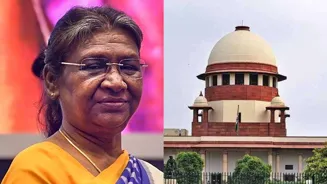What is the story about?
The Tamil Nadu and Kerala governments on Tuesday, August 19, questioned the Presidential Reference in the Supreme Court on the matter of a deadline being set by the court for the approval of the bills passed in state legislatures.
The counsels appearing for the Kerala government said that the President is merely acting on aid and advice of the council of ministers, claiming that the Centre government is seeking a review of the Supreme Court's judgement in disguise of a Presidential reference.
"President is bound by aid and advice of ministers, this reference is effectively by the Govt of India which is bypassing filing of review and is trying to overturn the Supreme Court's judgment," Senior Advocate KK Venugopal said.
The Tamil Nadu government's counsel stated that the Presidential Reference is a camouflaged attempt to overturn the apex court's ruling. The government also flagged the impact on the integrity of the Constitution.
"Presidential reference is nothing but an appeal over Supreme Court, howsoever nicely you may camouflage it. Presidential reference can’t be used to review SC judgments, not a substitute for review," Senior Advocate Abhishek Manu Singhvi told the Court.
The apex court commenced hearing the matter on August 19 after President Droupadi Murmu, on May 13, had sought Supreme Court's opinion on whether timelines for the assent of the bills passed by the state legislatures can be imposed through judicial intervention.
Invoking Article 143 (1) of the Constitution, she posed a set of 14 legal questions to the Court on the constitutional scope of powers given to the Governor and the President under Articles 200 and 201.
This was following the Supreme Court's judgement of April 8, where the bench of Justices JB Pardiwala and R Mahadevan while hearing the matter of Tamil Nadu government had ruled that the state's Governor must act on Bills "as soon as possible" without delaying the action indefinitely.
The Court had stated that the Governor cannot withhold assent based on "personal dissatisfaction, political expediency, or any other extraneous or irrelevant considerations" calling such measures as unconstitutional.
The counsels appearing for the Kerala government said that the President is merely acting on aid and advice of the council of ministers, claiming that the Centre government is seeking a review of the Supreme Court's judgement in disguise of a Presidential reference.
"President is bound by aid and advice of ministers, this reference is effectively by the Govt of India which is bypassing filing of review and is trying to overturn the Supreme Court's judgment," Senior Advocate KK Venugopal said.
The Tamil Nadu government's counsel stated that the Presidential Reference is a camouflaged attempt to overturn the apex court's ruling. The government also flagged the impact on the integrity of the Constitution.
"Presidential reference is nothing but an appeal over Supreme Court, howsoever nicely you may camouflage it. Presidential reference can’t be used to review SC judgments, not a substitute for review," Senior Advocate Abhishek Manu Singhvi told the Court.
The apex court commenced hearing the matter on August 19 after President Droupadi Murmu, on May 13, had sought Supreme Court's opinion on whether timelines for the assent of the bills passed by the state legislatures can be imposed through judicial intervention.
Invoking Article 143 (1) of the Constitution, she posed a set of 14 legal questions to the Court on the constitutional scope of powers given to the Governor and the President under Articles 200 and 201.
This was following the Supreme Court's judgement of April 8, where the bench of Justices JB Pardiwala and R Mahadevan while hearing the matter of Tamil Nadu government had ruled that the state's Governor must act on Bills "as soon as possible" without delaying the action indefinitely.
The Court had stated that the Governor cannot withhold assent based on "personal dissatisfaction, political expediency, or any other extraneous or irrelevant considerations" calling such measures as unconstitutional.





















![[WATCH] T20 World Cup 2026: Gautam Gambhir hosts dinner for Team India players ahead of Namibia clash](https://g-mob.glance-cdn.com/public/fc/image/7gXS1xdhs5Q0.webp)

